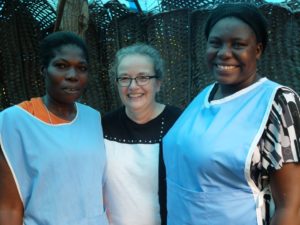Bottle recycling major part of Pugwash woman’s fundraising to feed 180 children and about 20 teachers

When it comes to charity, Joanne Cottrill isn’t the cut-a-cheque-and-walk-away type. This Pugwash, N.S., resident is a builder and walking away when people need help isn’t her style.
Each month, the cook at Pugwash District High School fundraises $1,800 to keep a lunch program in Haiti in operation.
For seven years, Cottrill’s sweat and her neighbours’ generosity has kept the money flowing and food in the bellies of 180 children and about 20 teachers.
“In the summertime, I go door to door at all the cottage areas around here … there is a lot,” said Cottrill in an interview with CBC’s Maritime Noon.
She collects bottles to redeem at the local recycling facility for cash.
“In the summertime, I would get approximately $100 a day from bottles,” said Cottrill.

Some people in Pugwash even drop their bottles off at Cottrill’s house to help out, while others attend Cottrill’s fundraising dinners and bake sales or just give her cash.
All that community support goes to supplying a meal of rice and beans to school kids every school day. In many cases, it’s the only meal many of the children will have that day, Cottrill said.
Many people in Haiti suffer from malnutrition as the country struggles to recover after the devastating earthquake in 2010 and the damaging hurricanes in the years that followed.
Cottrill saw that suffering firsthand when she went to the country in 2010 to help out. She worked at an orphanage, medical centre and malnutrition clinic for children.
“I saw many children who are severely malnourished, some of them did not survive and I saw these children and they’re not even healthy enough to attend school a lot of times. When they go to school, they can’t concentrate because they had nothing to eat that day,” she said.

Cottrill felt like she needed to do something to change that, so she started up a nutrition program at a school in Cazale, a village in a mountainous area of Haiti about 70 kilometres north of the capital, Port-au-Prince.
But when she returned in 2011, she noticed the children still weren’t getting enough nutrition.
Thousands feared dead as 7.0 quake hits Haiti
That setback didn’t stop Cottrill. She redoubled her efforts and launched a school lunch program to get the children more food. That lasted for a year until that school shut down.
Cottrill didn’t want to walk away, so she managed to take over the lunch program at the Repairer of the Breaches School, which is also in Cazale. She’s been running the program ever since.
The situation is far from perfect. The rice and beans the children eat are cooked over an open fire which is hard to maintain, so the school’s cooks asked if it would be possible to get a propane burner or stove.
“They have to come very early in the morning to get their fires going good enough that they can get a huge pot of water boiling and it’s very smoky at times. My daughter actually visited the school on Monday just past and she said, ‘Oh, mom, it was so smoky there. Your eyes were stinging and everything.'”
And Cottrill has come up with a solution — she’s working on raising even more money to buy a propane stove for the school.
Cottrill has contacted a company that makes propane stoves and installs them in schools and even offers a subsidy. The company is supposed to come and visit the school, but hasn’t yet because the village is so remote it takes awhile to organize transportation.
If the school qualifies for a subsidy, the cost of the stove and propane tanks will be about $700 US (approximately $900 Cdn), with an additional charge each month for the cost of fuel. Cottrill hopes the company will be able to visit the school in the next few weeks.


